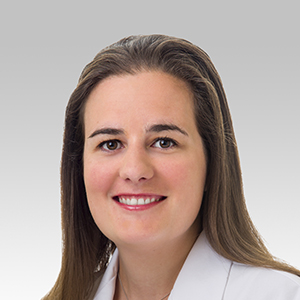Five Myths About Gynecologic Cancer
Learn the Facts About Ovarian, Cervical and Uterine Cancer
Published January 2020
Gynecologic cancers occur in the female reproductive organs, including the ovaries, cervix, endometrium, uterus, vagina and vulva. When it comes to your gynecologic health, be sure to stay informed and involved, as your body and risk factors change over time.
"With so many resources online, not to mention the opinions of friends and family, there's a lot of information out there. Common wisdom can be dangerous if it leads you to ignore symptoms or give up hope after diagnosis," says Emma L. Barber, MD, gynecologic oncologist at Northwestern Medicine.
Common wisdom can be dangerous.— Emma L. Barber, MD
Keep your facts straight by reviewing these five common myths about gynecologic cancer.
Myth No. 1: There are no early symptoms of gynecological cancer.
Fact: Many people with ovarian, uterine, cervical or vaginal cancer do have early warning signs. Common symptoms are abdominal pressure, fullness, swelling or bloating, urinary urgency, pelvic discomfort, or abnormal bleeding and discharge. Unlike other medical conditions with these same symptoms, gynecologic cancers generally get worse over time.
People with any of these symptoms who have been treated for other health conditions and the symptoms have not improved should schedule a follow-up visit with their physician or seek a second opinion. Those who have gone through menopause and develop any amount of vaginal bleeding (even spotting) should follow up with their physician immediately.
Myth No. 2: Pap tests can detect all gynecologic cancers.
Fact: Of all the gynecologic cancers, only cervical cancer can be detected with a Pap test. This test can detect cervical cancer early, when treatment is most effective. The Pap test also helps prevent cervical cancer by finding precancerous cell changes on the cervix that might become cervical cancer if they're not treated.
Pap tests cannot detect ovarian or uterine cancers. When one of these other types of cancer is suspected, a pelvic exam should be conducted to check for masses or growths, or diagnostic tests (such as a CA 125 blood test and/or transvaginal ultrasound) may be ordered.
Myth No. 3: Ovarian cancer is impossible to detect early.
Fact: Although ovarian cancer can be difficult to detect early because of its vague symptoms and location, research continues to advance detection and treatment. Additionally, some known factors increase your risk, including family history, personal history, genetic mutations, age and obesity.
This is particularly important because when ovarian cancer is diagnosed and treated early, the five-year survival rate is nearly 93%, and having a gynecologic oncologist perform surgery further increases your chances of survival. In addition, even in people with later stages of the disease, the survival rate is higher when treatment involves a combination of certain chemotherapy drugs, which can also help prevent recurrence.
Myth No. 4: Cervical cancer cannot be prevented.
Fact: Infection with the human papillomavirus, or HPV, must be present for cervical cancer to develop. HPV is the most commonly sexually transmitted infection, but the most common types of HPV can be prevented with an available vaccine. Cervical cancer usually develops slowly after ongoing HPV infection and often appears as a precancerous condition called dysplasia.
If detected early, HPV can be effectively treated to prevent cervical cancer from developing. Both the Pap test and the test for HPV can detect precancerous conditions, leading to early treatment. Children as young as age 9 may receive the HPV vaccine to help prevent cervical cancer.
Myth No. 5: Taking the birth control pill can increase your risk of getting gynecologic cancers.
Fact: Certain hormone-based contraceptives have been shown to reduce the risk of uterine, ovarian and endometrial cancers with long-term use. Talk to your physician to learn more.
When in doubt, discuss your risk factors or any symptoms of gynecologic cancer with your physician. Early diagnosis can be key to successful treatment.






